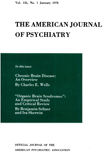ARE TRANQUILIZER COMBINATIONS MORE EFFECTIVE THAN A SINGLE TRANQUILIZER?
Abstract
This study sought to assess the common practice of combination tranquilizer therapy in chronic psychotics. Conducted under double-blind conditions, it compared the efficacy and side effects from 3 regimens over a course of 8 months: 1. Chlorpromazine plus trifluoperazine; 2 Chlorpromazine plus trifluoperazine placebo; and 3. Trifluoperazine plus chlorpromazine placebo. It showed that with the two drugs combined efficacy was greater than with these drugs used individually. It showed, too, that with the drugs in combination side effects were about half what they were with trifluoperazine and not much more than they were with chlorpromazine (18% and 12% respectively). Therefore, from this study, it appears that the combination of chlorpromazine and trifluoperazine offers advantages in patients who do not respond to treatment with a single tranquilizer or who develop limiting side effects on high doses of a single tranquilizer.
Access content
To read the fulltext, please use one of the options below to sign in or purchase access.- Personal login
- Institutional Login
- Sign in via OpenAthens
- Register for access
-
Please login/register if you wish to pair your device and check access availability.
Not a subscriber?
PsychiatryOnline subscription options offer access to the DSM-5 library, books, journals, CME, and patient resources. This all-in-one virtual library provides psychiatrists and mental health professionals with key resources for diagnosis, treatment, research, and professional development.
Need more help? PsychiatryOnline Customer Service may be reached by emailing [email protected] or by calling 800-368-5777 (in the U.S.) or 703-907-7322 (outside the U.S.).



